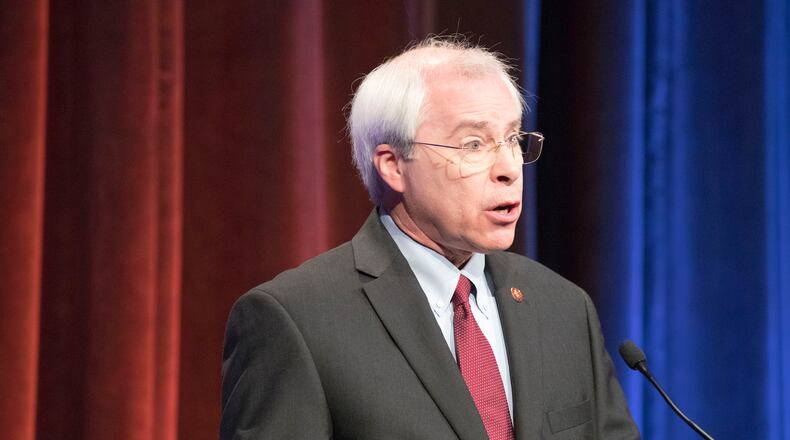When he was in Congress and constantly singled out as that body's last white Democrat from the Deep South, John Barrow survived by walking a very careful path between his black Democratic and white Republican constituencies.
Times change, and so has Barrow. He is done with being careful.
Last week, attorneys for the former Georgia congressman — Barrow was defeated in 2014 — served notice on the cream of the state Capitol, informing them that a witness chair in a federal courtroom might be in their futures.
Among the potential targets: Attorney General Chris Carr, Gov. Brian Kemp and his staff, Secretary of State Brad Raffensperger and the entire bench of the Georgia Supreme Court. All were warned against destroying potential evidence, down to the text messages on their smartphones.
At issue is the vanishing of a June 9 statewide election for a vacant seat on the Georgia Supreme Court, a contest that Barrow and former state GOP lawmaker Beth Beskin had signed up for in March, upon the announcement from Justice Keith Blackwell that he would resign Nov. 18 — 43 days before his term expires.
Raffensperger, the secretary of state, ordered the contest removed from the ballot, claiming that because of Blackwell’s early exit, finding his replacement was now a job for the governor rather than Georgia voters.
An actual election for the Blackwell seat would be delayed until 2022.
“Whether it’s about protecting Justice Blackwell’s pension or packing the court with members of the Federalist Society, it’s important that the voters and courts have access to those reasons and discussions,” said Michael Moore, one of Barrow’s attorneys and a former federal prosecutor.
Barrow and Beskin have filed separate state lawsuits challenging the elimination of the contest. Carr has successfully defended the decision at the superior court level — arguing that Blackwell’s resignation letter amounts to a contract that cannot be rescinded, and thus creates a scheduled vacuum that state law allows the governor to fill.
In which case, we might need to start thinking of Georgia’s judiciary as something like a commodity futures market.
Inside and outside the courtroom, Barrow has alleged collusion and manipulation. In mid-March, Barrow sought an expedited hearing before the state Supreme Court — but also called for all the high court’s justices, including Blackwell, to recuse themselves. Three have refused, and no decision from the court has come down.
Gloves have been removed. “It certainly seems to have been unusually difficult for the Georgia Supreme Court to simply do the right thing and let the people vote,” Moore told me Tuesday. “They have been dragging their feet, delaying their decision and have individually gone to great lengths to hang onto a case about their friend’s seat — one in which the rules for every other judge in the state would have unquestionably required recusal or disqualification.”
Last month, Barrow even called out Justice David Nahmias by name. “Nahmias is notorious for his attempts to dominate the Court,” he wrote in a highly unusual statement.
Stymied in state court, Barrow is now shifting his attention to federal court. He could file his own lawsuit or join one already underway — filed by three Georgia citizens, including the widow of former Georgia Supreme Court Justice Charles Weltner.
A spokeswoman for Carr declined to comment on Barrow’s letter of warning. But there is a precedent for the situation.
In 1980, in the throes of a troublesome divorce, Justice Jesse Bowles resigned twice from the state Supreme Court. The first time was only days after he’d been elected to another six-year term that November.
But by resigning before his new term began in January, Bowles had triggered a state law mandating a new statewide special election. So Bowles amended his resignation, alleging that he had only resigned from his current term, effective Dec. 31.
The justice was sworn into office again on Jan. 1, 1981, and resigned again four days later — giving Gov. George Busbee the opportunity to appoint his replacement, Vienna attorney Hardy Gregory. Three women filed suit in federal court, charging that the governor and his friends had illegally manipulated state law and robbed citizens of a vote to which they were entitled.
Members of Georgia’s political elite were indeed dragged to the witness stand. “It was a stormy, stormy time. Governor Busbee was very involved in that case,” said Michael Bowers, then a senior assistant in the state’s Law Department. He would later become attorney general.
The governor stayed at Bowers’ side through the trial and was called to testify. Busbee said his appointment was intended to spare taxpayers the $1 million cost of a special election — roughly the same amount the state eventually spent defending his decision. Capitol insiders also put out word that the governor was fearful that “plumber-turned-lawyer Jack Dorsey,” a former segregationist with a significant following, would enter the race.
The case went all the way to the U.S. Supreme Court, with the state losing at every level. It did not help that, according to testimony, Busbee and Justice Bowles had talked about the timing for Bowles’ departure over breakfast at the Governor’s Mansion — more than a year before it happened. A subsequent editorial in The Atlanta Constitution referred to the episode as “one of the few blemishes on the record of Gov. George Busbee.”
The long delayed special election was held — and won by Hardy Gregory, the man whom Busbee had picked as Bowles’ replacement. Gregory, like the governor, had been a named defendant in the lawsuit.
Some years after the dust had settled, Gregory wrote about the affair in a scholarly paper for the University of Virginia School of Law. In Footnote No. 100, Gregory recommended the experience to his fellow benchwarmers.
“The drama, excitement, and fear of the courtroom constitute a reality for all, but they are immeasurably heightened for a defendant whose future is at stake,” he wrote. “From that time forward, the defendant who reassumes his own position on the bench to judge the affairs of others will harbor much more empathy for those poor devils seated in the courtroom who have so much at risk.
“Decisions will come harder,” the justice wrote.
It may be a lesson that’s about to be relearned.
About the Author
The Latest
Featured




